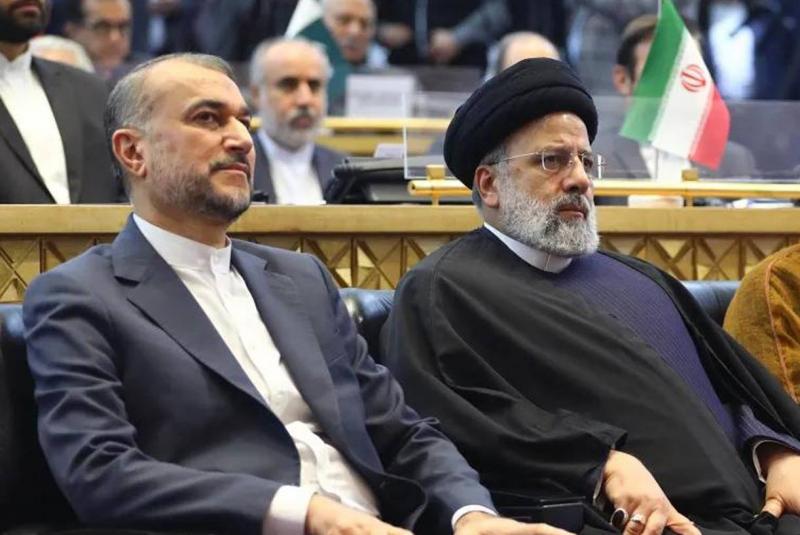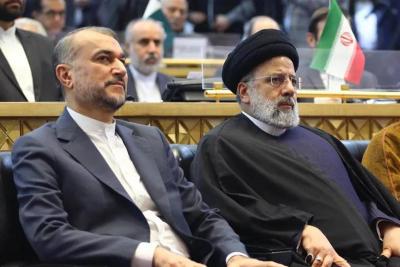The "Al-Arabiya" channel reported that "in 2021, when Ibrahim Raisi was elected President of the Islamic Republic of Iran, a group of leaders from the 'Resistance Axis' attended the inauguration ceremony, seated in the front row for clear visibility to the cameras. Among those present were leaders from Lebanon, Palestine, Yemen, Iraq, and even Bahrain; this was a message to emphasize the important role played by these factions as a 'hard power' achieving goals for Iran that cannot be attained through traditional diplomacy, but rather exclusively through 'non-state forces' that have strong relations, common interests, and intersecting ideological perceptions."
In a special report, the channel stated that "Raisi left the presidency shortly after the helicopter crash that also involved the late Foreign Minister Amir Hossein Abdullahian and their accompanying delegation. Raisi and Abdullahian were notable figures characterized by their deep belief in the values of the 'Islamic Revolution' and their obedience to the orders of Supreme Leader Ali Khamenei, and they had good relations with the 'Revolutionary Guards'. Minister Abdullahian, despite his 'open' stance towards neighboring Arab countries, was a 'loyal son' of the 'Guard', and like Raisi, had strong ties with Iranian-affiliated parties and groups. He was active in recent months coordinating among the parties of the 'Resistance Axis' during the Israeli war on Gaza that followed Hamas' attack on October 7, 2023."
The channel added: "The scene of the 'Resistance Axis' gathering during the inauguration of the late president Ibrahim Raisi in 2021 was repeated, this time during the mourning ceremonies. The Iranian capital Tehran witnessed a meeting between the leadership of the 'Revolutionary Guards' and prominent figures in the 'Resistance Axis', attended by a group of factions including: Hamas, Islamic Jihad, Hezbollah Lebanon, and the Houthis. Notably, the meeting was attended by the commander of the 'Revolutionary Guards', Major General Hossein Salami, and the commander of the 'Quds Force', Brigadier General Esmail Qaani, along with the head of Hamas' political bureau Ismail Haniyeh, the deputy secretary-general of Islamic Jihad, Mohammad Hindi, and the deputy secretary-general of Hezbollah, Naim Qassem."
The report questioned: "What message was intended to be sent? Likely, the goal was to affirm that the 'Resistance Axis' has not disbanded, and although the absence of Ibrahim Raisi and Amir Hossein Abdullahian is a significant loss, the 'axis' remains strong and cohesive, especially since this inter-state alliance is based on the cooperation of militias, arms, and revolutionary ideas rather than being reliant on individuals who may come and go. This Iranian policy founded on supporting and investing in the 'Resistance Axis' was emphasized by the acting executive authority Mohammad Makhlaghi, who confirmed in a phone call with the Secretary-General of 'Islamic Jihad' Ziad al-Nakhalah that 'Iran's fundamental strategy in supporting the Resistance Movement, especially the Palestinian resistance factions, will not change with the change of individuals', considering that 'Operation Al-Wa’ad Al-Sadiq (The True Promise) is one of the outcomes of the Resistance Movement that broke American hegemony and the Zionist entity.'"
The channel continued: "Returning to the meeting of the 'Resistance Axis' on the sidelines of President Ibrahim Raisi's funeral, according to Iranian media, it was confirmed that 'the jihad and struggle would continue until the complete victory of the Palestinian resistance in Gaza with the participation of the factions of the Resistance Axis', as well as discussing the developments in the political, social, and military situation in Gaza, and the position on ongoing developments."
It added: "This coordination among Palestinian, Lebanese, Iraqi, and Yemeni factions will continue, as it serves their mutual interests and Iran at the same time, and no pivotal changes can occur due to the death of the Iranian president and his foreign minister, as the administrative policy concerning the 'factions' is entrusted to the 'Quds Force', the external arm of the 'Revolutionary Guards', which coordinates directly with the Office of the Supreme Leader. Thus, support from Tehran for its allies and external proxies will continue as dictated by political interests and shifts in security and field conditions."




